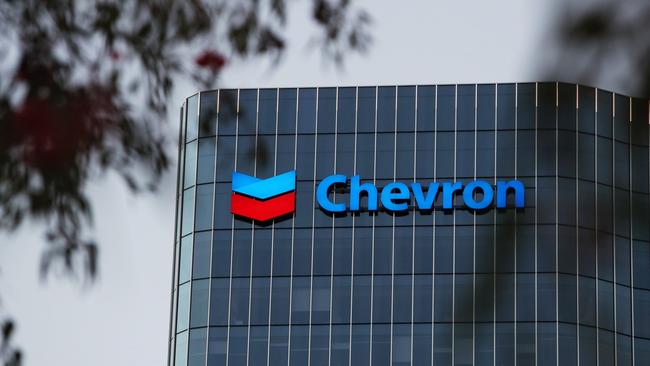Chevron and union agree to end strikes threatening LNG supplies
A deal has been struck between Chevron and the Offshore Alliance to end weeks-long strikes that threatened about 7 per cent of the world’s LNG supplies.
Strikes that have threatened 7 per cent of the world’s LNG market will end after Chevron and the Offshore Alliance agreed a deal to cease industrial action.
Chevron and the Offshore Alliance, which represents the Australian Workers’ Union and the Maritime Union of Australia, had been locked in a dispute over pay and conditions for weeks, with the union recently beginning prolonged strikes designed to crimp LNG production.
The two sides had been ordered back to last-minute mediation talks, and despite both sides expressing little hope of a deal, Fair Work Commissioner Bernie Riordan said on Thursday a deal was close and floated his suggestions on compromises both could make to end the industrial action.
After marathon considerations, both Chevron and the Offshore Alliance said they have accepted the recommendations, and strikes would be called off as the agreement was drafted and sent to workers.
Offshore Alliance spokesman and, WA secretary of the Australian Workers Union Brad Gandy said the deal delivered for workers.
“Commissioner Riordan’s recommendation contains substantial improvements in terms and conditions of employment including increased remuneration, job security, locked-in rosters, career progression and returning all employees to a 40 per cent roster,” Mr Gandy said.
The end of strikes will calm the nerves of the LNG market as European buyers fretted about being squeezed by competition from Asia, sending European prices soaring.
The wild swings in European prices had stoked fears about a fresh energy crunch with gas prices a key driver in the recent surge of inflation in the region.
Energy analyst Saul Kavonic said the deal will temper global nerves and install stability for years to come across key export operations.

“This draws to a close the saga whereby a few hundred workers in hi vis overalls offshore Western Australia brought European gas traders to their knees, causing tens of billions of dollars in market movements after threatening to disrupt around ten per cent of global LNG supply,” Mr Kavonic said.
“With union agreements now in place across most of the offshore Australian LNG plants, which last around four years, this should see an end to most of the industrial action offshore Western Australia for the next few years.”
Chevron had been the last major producer in WA without an labour agreement.
Workers at Shell, Inpex and Woodside have all recently signed agreements of their own.
The deal will temper simmering tensions between the union and Chevron as they struggled to find common ground.
Workers will now begin working without disruption with union members losing many of hours of pay during the industrial action.
The union had accused Chevron of offering less than its peers, while the gas giant had said the Offshore Union was seeking more lucrative terms.
The Offshore Alliance had sought to walk a fine line by seeking to curtail LNG production without inhibiting local gas output.
WA is Australia’s most gas-dependent state, and the state government had said it would intervene and end strikes if domestic production was impacted but Australian authorities have shown no appetite to intervene if exports are threatened.
Gorgon and Wheatstone supply 44 per cent of WA’s domestic gas and daily revenue from the projects is estimated at $76m a day, according to the consultancy, EnergyQuest.
Chevron had been battling to maintain LNG production, a lucrative market that countries such as Japan and Korea rely on. It has used non-union workers to maintain so-called steady state production, but there are question marks over how long it can continue for.
EnergyQuest said Japanese buyers are most exposed to production-impacting strikes at Chevron, estimating 16 per cent of its supplies comes from Chevron alone.
If Japanese buyers are forced to seek alternative cargoes, global gas prices will rise — most notably in Europe which fears heightened competition from Asia.



To join the conversation, please log in. Don't have an account? Register
Join the conversation, you are commenting as Logout